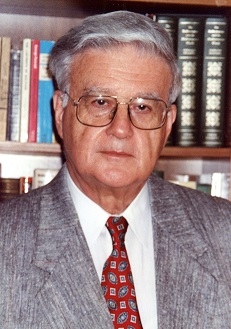Barisa Krekic
Biography
BARISA KREKIC (14 October 1928 – 12 January 2021)
Barisa Krekic was a professor in the History Department from 1970 until his retirement in 1994, and taught the history of Byzantium as well as the history of the medieval and early modern Balkans. He served UCLA also as Director of the Center for Russian and East European Studies.
His family had long roots in Ragusa, where he was born in 1928. The stories he heard in his childhood were those of the Austro-Hungarian Empire, while he himself experienced the deprivations of the Second World War and the limitations of the Communist Era. He studied at Belgrade where he obtained his doctorate in 1954. The famous Russian Byzantinist George Ostrogorsky soon depended on him as his assistant at the Serbian Academy of Sciences. He became a professor at the University of Novi Sad in 1956, a position he held until 1970. During this time, he had Visiting Professorships at Indiana University, Bloomington, and at Stanford University. UCLA recruited him as professor in 1970. Visiting Professorships took him to Dumbarton Oaks (Harvard’s international research center in Byzantine Studies) as well as the Central European University in Budapest.
Formative for his future academic development was the year he spent as a postdoctoral researcher in Paris, 1957-8, where he was a contemporary of Helene Ahrweiler. Among his teachers were the historian of Byzantine culture and social life Paul Lemerle and the historian Fernand Braudel. It was the latter who impressed upon his students the importance to study the Mediterranean as a historical and cultural unit, rather than as a divided space, and Ragusa as a key location in this context.
Indeed, Krekic engaged with these issues several decades before ‘Mediterranean Studies’ became a distinct area of research, and his seminal works have become the point of departure for a current generation of scholars who turn their attention to Ragusa as the place where the multiple interactions between the Western, Catholic and the Eastern, Orthodox worlds come into focus. He often spent his summers in Venice, collecting Ragusan documents in the Archivio di Stato. He entrusted his ample research notes to the UCLA library. He also remained connected with Dubrovnik, holding several leadership functions in its Inter-University Center.
Barisa Krekic’s books include: Dubrovnik (Raguse) et le Levant au Moyen Âge (1961), Dubrovnik in the 14th and 15th Centuries: A City between East and West (1972), Dubrovnik, Italy and the Balkans in the Late Middle Ages (1980), Dubrovnik: A Mediterranean Urban Society, 1300–1600 (1997), Unequal Rivals: Essays on Relations between Dubrovnik and Venice in the Thirteenth and Fourteenth Centuries (2007), in addition to edited volumes, articles and book reviews.
His active years in the History Department coincided with those of several great scholars, many of them trained in Europe: the Medievalist Gerhardt Ladner, the Byzantinist Speros Vryonis Jr., the Ottomanist Stanford Shaw and the Armenian historian Richard Hovanissian, as well as the historian of Ancient Greece Mortimer Chambers, the historian of Russia Hans Rogge and the historian of early modern France Eugen Weber. He was also closely associated with Henrik Birnbaum in the Department of Slavonic Literatures and Cultures.
Together with his wife Ruzica Popovic-Krekic, herself a scholar of Russia and active in Serbian cultural life in Los Angeles and beyond (she passed away in 2011, making his last years of declining health very lonely), Barisa Krekic maintained a circle of learned friends— all of them Californians by deep conviction—with personal or intellectual roots in Europe. Some of the colleagues mentioned above together with their equally learned wives belonged to this circle, along with many others. Dinner table conversations were always spirited and wide-ranging. He also cared deeply about students and younger scholars.
His gracious manner, deep erudition and warm humanity will be fondly remembered by all who were fortunate to know him.
— Obituary from Claudia Rapp, UCLA Department of History (1993-2011), University of Vienna (2011-)


